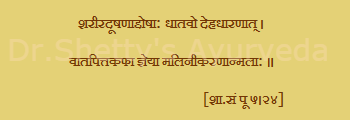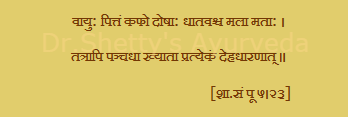Ayurveda being the oldest system of medicine has various theories and principles of life. Among them, the Panchamahabhautika principle and Tridosha principles are the most important and basic principles of Ayurveda. These clearly explain both the structural and functional aspects of human being.
Tridosha principle
According to Ayurveda, Tridoshas are responsible for all the physiological and pathological processes that occur in the body. The Tridosha are the basic elements or Bio-energies namely Vata, Pitta and Kapha.
According to Ayurveda all substances are Panchamahabhautik i.e., they are composed of the five basic elements (Prithvi, Aap, Teja, Vayu and Akasha). The percentage of predominance may differ according to substances. Tridoshas are also no exception. That means, the three doshas are also composed of all the five basic elements- Panchamahabhutas.
The predominance of Panchamahabhuta in each dosha is as follows:
Doshas Predominance of Panchamahabhuta
Vata – Vayu + Akasha
Pitta – Agni + Jala
Kapha – Jala + Prithvi
Among the Panchamahabhutas, Vayu, Agni and Jala have a dominant role and vital function in life for existence and development. The other two mahabhutas i.e., Akasha and Prithvi have not been mentioned in the tridosha principle directly because Akasha mahabhuta is all pervasive and nothing can remain in it and Prithvi Bhuta is the basis of every object. Therefore Tridosha principle is practical and based on the applied aspects. Panchamahabhutas form the structural entity of the body and the tridosha are responsible for maintaining the functional aspects in the body.
Definition of Dosha

The term dosha means, the factor which is not only capable of vitiation but also of vitiating other factors of the body is known as Dosha.
Doshas are of two types
- Shareerika doshas – Somatic humors
- Manasika doshas – Psychic humors
The doshas that are capable of getting vitiated due to their respective causes and modify or disturb the physiological functions of the body are called as Shareerika dosha- somatic humors. Due to these disturbances/ imbalances, a disease gets manifested.
Both physical body and mind are the seats of diseases. The doshas which can vitiate the mind to cause mental disorders are called the Manasika doshas- Psychic humors.
When these Shareerika doshas and the Manasika doshas are in a state of equilibrium, perform and control all the physiological processes of both body and mind and hence are responsible for maintenance of health. Then they are called as ‘Tridhatus’. The word dhatu means a factor that supports the body or the physiological processes of a body.
A reference of the word Tridhatu is also available in Rigveda. Sayana, the commentator of vedas, explains this term as a synonym for Vata, Pitta and Kapha.
Number of doshas
The word tridosha means that the Shareerika doshas/somatic humors are only three in number. But some of the Ayurvedic scholars had an opinion that even Rakta/blood should also be considered as dosha. Acharya Sushrutha has emphasized the significant role of Rakta in causing a disease. Even though Rakta cannot be accepted as dosha because of the following important reasons. Rakta is a dhatu and is formed and nourished by the process of dhatuparinama. Also, Vata, Pitta and Kapha are vitiated independently by asatmendriyartha samyoga, prajnaaparadha and parinama. Rakta has no such independent capacity to get vitiated, unless associated with the vitiated Vata, Pitta or Kapha and therefore it is recognised as dushya only. Yakrit and Pleeha are the seats of Rakta, also they are the seats of Pitta. Rakta is also the seat of Pitta. But neither Vata, Pitta nor Kapha has been stated as a seat of rakta. Hence Rakta cannot be considered as a dosha. Prakriti of a person is classified as Vatika, Paitika and Kaphaja but there is no prakriti classified as Raktaja. This classification is based on the tridosha. Due to the above mentioned reasons we can clearly say that Rakta cannot be considered as dosha.
The aim of Ayurveda is to keep the three doshas in balance.
The doshas should ideally be in balance, which is synonymous with perfect health. If any one, two or all three Doshas are over functioning or under-functioning, that can be observed in an excess or too low functional activity in a body and causes various pathological conditions.
Author:
Ayurveda Doctor and Panchakarma Expert





